Bradley Wiggins: Has former Tour de France winner underachieved?
- Published
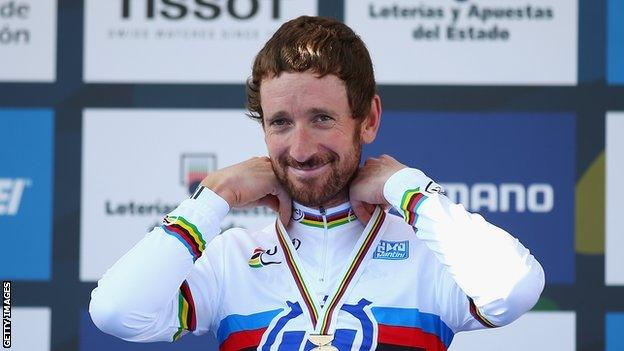
Sir Bradley Wiggins stands on the podium after winning the elite men's individual time trial on day four of the UCI Road World Championships in 2014
Here is a tale that will confirm the darkest suspicions of social media's more cynical back-alleys: Michele Ferrari, perhaps cycling's most notorious doping doctor, played a role in Sir Bradley Wiggins' rise to the top. Hold on, it's not like that.
Ferrari could always spot a decent rider and is still full of little maxims about what makes a champion, which is what Wiggins undoubtedly is, regardless of what happens in his final serious race as a road cyclist on Sunday, Paris-Roubaix.
Yet there are some, including Irish cycling great and Eurosport , externalcommentator Sean Kelly, who suggest Wiggins has perhaps not quite fulfilled his potential on the road.
Jonathan Vaughters was reminded of one of controversial Italian Ferrari's theories whilst watching Wiggins ride away from some of the best young stage-racers on a bumpy day in the 2005 Tour de l'Avenir, or "Tour of the Future".
A year before, the lanky Londoner had achieved what many experts considered to be the height of his and their expectations by winning gold, silver and bronze medals in the Olympic velodrome in Athens.
Olympic cycling: Watch Bradley Wiggins win time trial gold
Britain had enjoyed track success before, you see, and Wiggins was just the most recent "rosbif" to master the one-dimensional discipline of riding fast against a clock, with no geographic, meteorological or racing impediments in the way: or so most of the professional peloton thought.
But Vaughters, who was now thinking about running his own team, viewed Wiggins' surprise win that day differently.
He saw the embodiment of Ferrari's belief that if you can find a young cyclist who can generate 500 watts of power for five minutes, which is basically what Wiggins had done to win his Olympic pursuit title, they might be able to sustain that for 50 minutes as a mature cyclist.
And if you can stamp out 500 watts for that long, you might be able to win a Tour de France, on the right course.
Sir Bradley Wiggins | |
|---|---|
Wiggins became the first Briton to win the Tour de France when he triumphed in 2012. Later that summer, he won his first Olympic title on the road with victory in the time trial at London 2012. | The 34-year-old has won four Olympic gold medals, plus one silver and two bronzes. If he wins an eighth in Rio, he will become the most decorated British athlete in Olympic history. |
Victory in the world time trial last year meant Wiggins has now won world and Olympic titles on both the track and road. | Wiggins has won 13 World Championship medals, seven of them gold. He also has four Commonwealth silvers. |
So when Wiggins finally tired of alternating between the very professional accumulation of track medals for Great Britain and the slightly amateurish attempts to convince French pro teams he could win road races too, Vaughters signed him for Garmin-Slipstream. That was September 2008.
Ten months later, a slimmed-down Wiggins was riding shoulder to shoulder with Alberto Contador, the Schleck brothers and Ferrari's most famous pupil, Lance Armstrong, on the final climbs of the toughest stages at the 2009 Tour.
Wiggins would eventually finish fourth,, external matching Robert Millar's best ever finish by a British rider (and it was later upgraded to third), only to actually go and win the thing when Armstrong was slung out of the sport in 2012.
He and Vaughters had parted company by then, somewhat acrimoniously, but the transfer fee the American extracted from Team Sky for Wiggins' repatriation in 2010 was still subsidising Garmin's racing programme, so the relationship was not completely over.
The point of this story is not just to titillate the Twittersphere with "a Ferrari fuelled Wiggo" anecdote, or to highlight Vaughters' eye for a bargain, it is to point out that Wiggins leaves road cycling with a haul of titles that could be even more impressive if only he had realised just how good he was (or somebody else realised just how good he was) a few years earlier.
He was 29 when he made that Tour breakthrough - and there were other good results in 2009, too - but he struggled in his first year in Team Sky colours, in 2010, seemingly weighed down by the expectations that came with his new "contender" status and leadership role.
Which is why 2011 is arguably more significant than the near-perfect 2012 in his transition from popular Olympian to British cycling's first superstar.
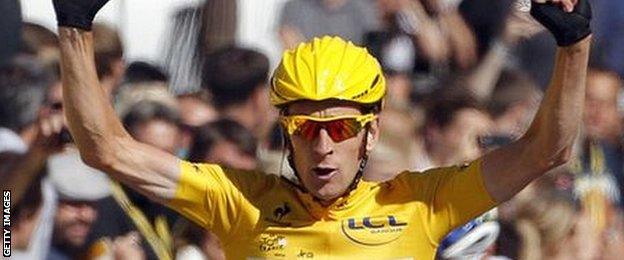
Bradley Wiggins celebrates winning the Tour de France in 2012 at the age of 32
A first half to the season seemed to set him up for a real tilt at a very open Tour, only to break a collarbone in a crash. It would have been easy for him to think 'this race is cursed and nobody knocks me off on the track'.
But he came back, two months later, to finish third at the Vuelta and second in the time trial at the World Championships to Germany's Tony Martin. He would also help tow Mark Cavendish to victory in the road race, a performance that foreshadowed what was to come for British cycling.
What followed has been relayed and replayed many times before, but it is worth pointing out he remains the only rider in history to win the pre-Tour hat-trick of Paris-Nice, Tour of Romandie and Criterium du Dauphine and the Tour in the same season, before capping that by becoming the only man to win the Tour and Olympic gold in the same year.
But having pointed that out, you have to make the counterpoint that his team-mate Chris Froome could have won the Vuelta in 2011 if the team had been riding for him from the start, not Wiggins, a mistake the younger man appeared to want to flag up during two notorious stages at the 2012 Tour.
Wiggins has since said he did not enjoy winning the Tour at all - he hated the pressure, the media intrusion and the dynamics of his relationship with Froome - and he did not need to confirm that he did not enjoy 2013 much either, it was obvious. Even winning the Tour of Britain and another silver medal at the Worlds failed to raise much of a smile.
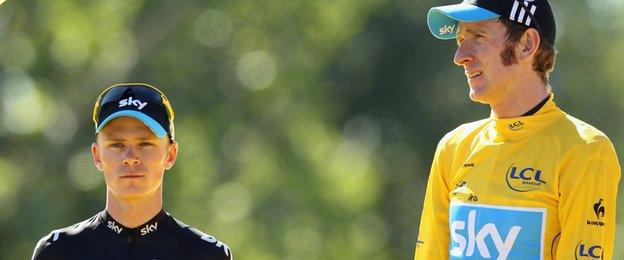
Chris Froome and Bradley Wiggins have rarely seen eye to eye as Team Sky team-mates
But the swagger was back last year, give or take Froome's refusal to have him on board for his own Tour defence with Team Sky, and when he beat his (other) great rival Martin to win a memorable world time trial title last September, some wondered if he might pack it in right there.
That certainly occurred to his great mentor and boss for a few more days, Sir Dave Brailsford.
When asked at Team Sky's winter camp in Majorca about Martin's belief that Wiggins was quitting the road too early, Brailsford said: "You can never tell with a great champion.
"He could have finished at the Worlds, that would certainly have been a great way to go, but a lot of thinking has gone into this, and he still had things he wanted to achieve with us, Roubaix, for example.
"But there was always the goal of [next summer's] Rio [Olympics]. So this is a great solution and a credit to everybody involved.
"This is just the end of his story on the road but it's not the end of the whole story."
In fact, Wiggins' attempt to become the first British rider to win the most unpredictable of cycling's one-day classics is not even his penultimate chapter.
Geraint Thomas |
|---|
"Ian Stannard and I have similar roles; to get to the final stages and help Bradley Wiggins. We don't have to ride on the front of the race but we can be up the road, forcing others to waste energy by chasing us down. This race suits: Bradley Wiggins. |
"When he knuckles down to do something he's hard to beat. However, he will need a bit of luck on his side because the cobbles can take anyone down." |
He will be at the Tour de Yorkshire next month in the colours of Team Wiggins, the team pursuit training vehicle/ British Cycling development squad he is fronting until he really does ride off into the sunset in Brazil, with the small matter of what could be an era-defining assault on cycling's Hour Record in between in June.
So Brailsford is right, his story is far from finished, and yet there is an unmistakeable feeling of finality about this weekend; an acceptance that his work on this stage, at this level, is done. It feels like David Beckham or Steven Gerrard moving to Major League Soccer.

Sean Kelly, one of the modern era's greatest riders and seen here at the 1989 Tour de France, believes Wiggins has not quite fulfilled his enormous potential as a road cyclist
"Part of me thinks he's had a remarkable career, particularly when you think about him winning a Tour after not looking like he'd ever be able to do that as a younger rider," said Sean Kelly.
"But another part of me thinks it's a pity he didn't try to win another Tour. I know there were circumstances with the team, but if he was really hungry to win another one - and most riders are, that's their natural instinct - he could have changed teams.
"That wasn't the case with Wiggins, though, which is fine. He just wanted to put a tick next to the Tour and move on to something else.
"But if he was to win Paris-Roubaix… wow, I would say he could have won so many more races during his career: another Tour, a Giro, more classics.
"He was, and still is, so versatile and that gives you so many opportunities. Did he realise that too late in his career? I don't know."
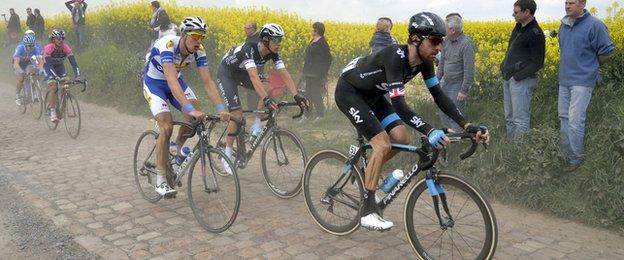
Wiggins competes on the Paris-Roubaix cobbles in 2014 - he has compared the race's difficulty to moonwalking
Can Wiggins bolster his already impressive claim to being one of the best all-round riders ever by traversing Paris-Roubaix's 27 cobbled sections and 253km quicker than the host of big names who dedicated their entire careers to the race?
Speaking last month, Cavendish, his old GB and Team Sky team-mate, said people have been underestimating Wiggins' knack for focusing on certain goals for years, a point you hear time and time again from those who know him well.
"When he really wants to do something he normally does it," said Cavendish.
An experienced member of Team Sky's support staff made a similar point last month, adding that if Wiggins is on the start line on Sunday, he will think he can win.
If he does not think that, he will not line up.
There has been perhaps a little bit too much of that for some fans from Wiggins in recent years, which is a fair comment, although some of that has been his response to the regime change within what was his team from 2010 to 2012, and some has just been his attempt to be a family man in a sport more suited for the single-minded.
But if he does not win another thing between now and the time he really does call it quits, he should always be thanked, in this country at least, for making cycling cool and fun again after a period when the likes of Ferrari and friends tried to turn it into the sporting equivalent of double chemistry.
- Published12 April 2015
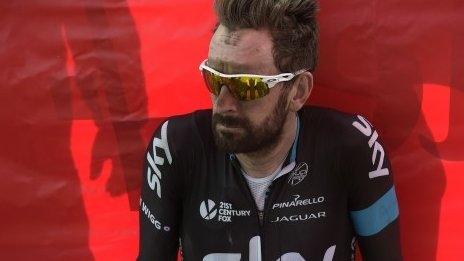
- Published7 April 2015
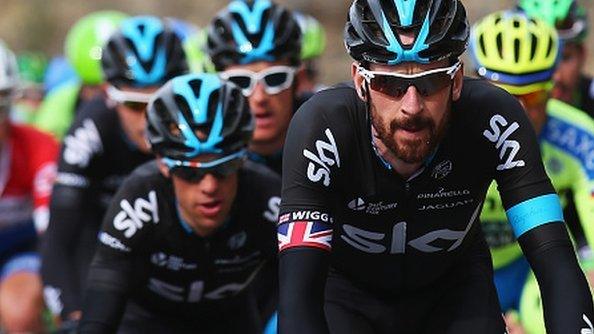
- Published4 September 2014
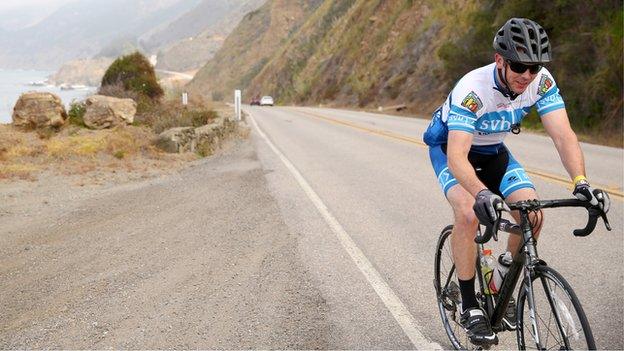
- Published19 July 2013
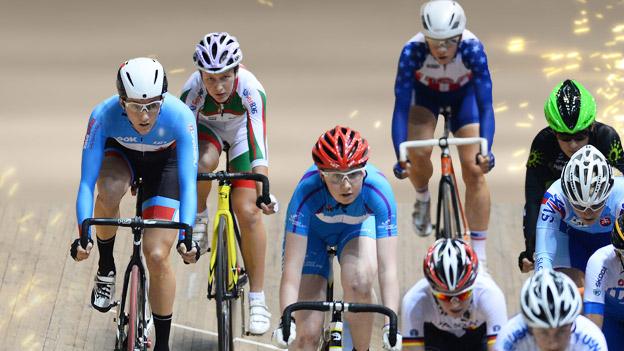
- Published19 July 2016
